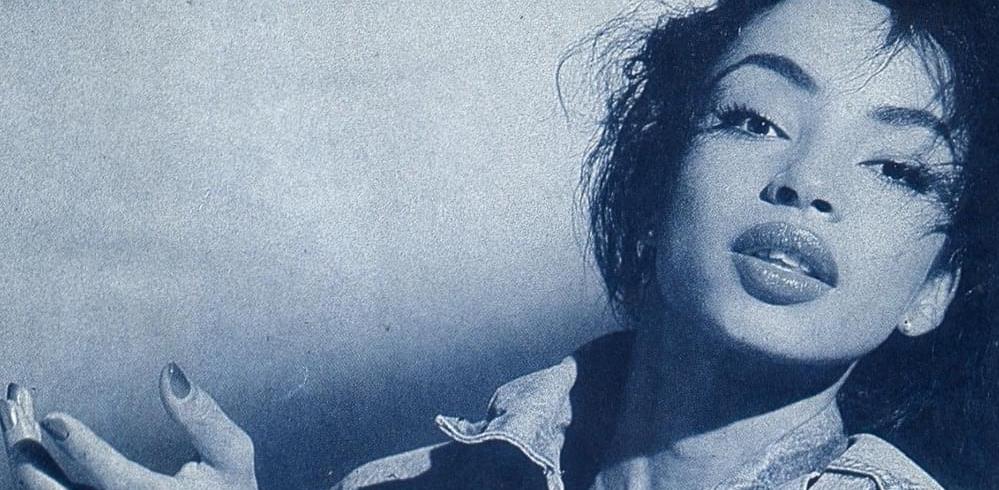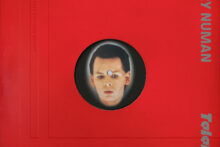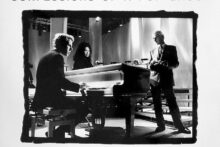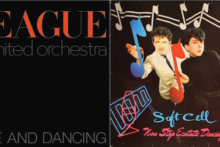Few albums purr ‘mid-80s’ more seductively than Sade’s Diamond Life, which captures, in its style and substance, both the popular alienation after Thatcher’s 1983 landslide and the populist, aspirational culture Thatcherism enabled. With 1984 being the year of the miners’ strike and the year of the yuppie (according to Newsweek), it provided a pivot between initial resistance to the new politics – audible in punk and its offshoots, synth pop and new wave – and subsequent consent. Beyond Gary Numan and Mark E. Smith, this consent was less about endorsement than disengagement, a withdrawal from the political to the personal realm – but also, yes, the draw of the diamond life. This was mirrored culturally by a shift from the primitivist austerity of post punk to the polished commerciality of new pop, and particularly the cosmopolitan suaveness of what’s now called ‘sophisti-pop’ – all Latin grooves, tasty jazz licks and turtlenecks – of which Sade was the apogee.
All this is beautifully distilled in Diamond Life’s opening track, ‘Smooth Operator’ – inescapable in summer 1984 as it breezed out of BMWs and ghetto-blasters, glitzy restaurants and greasy spoons. ‘Smooth Operator’ captures its moment from its bossa nova groove to Stuart Matthewman’s cool-jazz saxophone solo; from its homoeroticism (those eyes; that Streetcar Named Desire reference), to its jet-set glamour (“coast to coast, LA to Chicago”); from its yuppie subject (“city lights, business nights”) to – most of all – its ambivalence about him. As ruthless in love as a in business, the smooth operator personifies both the globalised capitalism that neoliberalism unleashed and the affective mode it deregulated. The lines, “Melts all your memories and change into gold/ His eyes are like angels; his heart is cold” brilliantly capture the 80s alchemy of monetising everything, and an attendant instrumentalism that jettisoned empathy along with 70s collectivity. Yet this jetsetter also represents the allure of the diamond life: hence the slick sensuality of the instrumental track and Sade’s pristinely seductive – lightly grazed, slightly detached – vocal. We’d like either to be the smooth operator or possess a piece of him (“minimum waste/ maximum joy”), because – in the most 80s trope of all – the net gain could be worth the collateral risk.
The rest of the album divides this ambivalence into positives and negatives, wins and losses: on one hand homoerotic love songs – the oral-sex hymning ‘Your Love is King’; the wild-boy stanning ‘Cherry Pie’ – on the other, social commentary, depictions of the upturn’s downside. Inhabiting the underside of the diamond life, ‘Sally’ can be seen as either a sex worker or the Salvation Army, offering solace to the casualties of an atomised society: “doing our dirty work”. That these casualties are all male bespeaks a gender readjustment as masculine industries like mining were dismantled and a service economy empowered women in the workforce. Equally, in music, female, queer, keyboard-and horn-driven new pop dislodged the ‘rockist’ masculinity of guitar-bass-drums. In Sade, the boys are decorative background in their little brimmed hats and tight white vests, while the aloof singer is the band. On ‘When Am I Going to Make a Living’, the period’s losers are imbricated with its winners: “See the people fussing and thieving/ While the sharks are wheeling and dealing”. This rejection of atomisation is again anchored in the collective voice – “We’re hungry but we won’t give in” – defying the authoritarians who’ll “waste your body and soul if you allow them to”. With Thatcherite self-empowerment (“it’s up to you what you can do”) shading defiance, there’s still an ambivalence here, while sonically, Diamond Life’s sumptuous accoutrements pull against its protest credentials, like its soft rock precursor (compare ‘Smooth Operator’ to Steely Dan’s ‘Do it Again’). Sade’s luxury and coolness is some distance from the punk austerity and heat that was still audible in Billy Bragg, the Redskins, The Clash, The Pogues and – as ubiquitous as Sade in 1984 – The Smiths.
Stylish, homoerotic, mannered, yet proudly working class, The Smiths complicate the concept of ‘sophistication’. Whether sophistication is the possession of the aristocracy and their bourgeois courtiers – something to which ordinary people can only aspire – or a democratic potentiality goes to the heart of class mobility and ‘authenticity’. While the snappiest-dressed subcultures hitherto had retained a rough end-grain – from mods (The Who, The Kinks) to hippie dandies (the Stones, Traffic) to glam rockers (Bowie, Roxy) – these proletarian upstarts didn’t just emulate high society style, they parodied and symbolically repossessed it. Amidst Thatcher’s deliberate reversal of working-class gains, however, aristocratic style was valorised in and of itself, through the Lady Di cult – even George Michael copped her haircut – TV drama Brideshead Revisited (1981), The Face’s celebration of Sloane Rangers and the new romantics’ style over substance. Roxy were paradigmatic of this shift, as Bryan Ferry, from 1979’s ‘Dance Away’ onwards, lost his inverted commas and became the lounge lizard he’d previously pastiched.
As, concomitantly, the yuppie became a cultural avatar, synth pop’s businessman-machines began as satire, with Kraftwerk and John Foxx, but became increasingly ambivalent with Gary Numan’s solo work and former Human Leaguers Heaven 17. With Heaven 17’s late-1981 Penthouse And Pavement concurrent with the League’s Dare, this pairing was new pop’s precursor, trading austerity for luxury. While the potential for musical and political sellout was written into new pop from the off therefore, desire and utopianism, equally, couldn’t simply be ceded to the resurgent right. Penthouse gilded synth pop with soul vocals and funk guitars, its commerciality forming a complete package with its corporate sleeve and the trio’s yuppie style (the ponytail and suit combo being one of history’s worst style crimes). Yet Heaven 17 were pavement not penthouse – an album that starts with ‘We Don’t Need this Fascist Groove Thang’ isn’t seriously advocating anyone ‘Play To Win’. Yet, suave, muso and mannered, Heaven 17’s yuppie satire soon became yuppie soundtrack, and by 1982 Duran Duran had rendered corporate style sexy in the ‘Rio’ video. By the mid-80s, the ubiquity of “bands in business suits” made it less ‘Hip To Be Square’, as Huey Lewis and the News put it in 1983, than hip to be rich.
Nonetheless, new pop often retained some facet of post punk abrasiveness in sound or style – Altered Images’ 1981 ‘I Could Be Happy’, Orange Juice’s 1982 You Can’t Hide Your Love Forever, Madness’s late-82 The Rise & Fall or New Order’s 1983 ‘Confusion’. Yet in its more self-conscious sophisti-pop iteration, this postmodern pop increasingly edged into complacency and, hence, consent. From ex-Young Marble Giant Allison Statton coolly classy La Varieté with Weekend to Haircut 100’s cheerfully cheesy ‘Fantastic Day’, this was punk’s frown turned upside down, the Latin accents and polite horns a gauche reaffirmation of the soft-rock tastefulness punk had come to sweep away. Often regarded as sophisti-pop’s year zero, Roxy Music’s spring 1982 Avalon split the difference between beauty and blandness, and was followed by Roxy’s art-pop heirs, the Associates’ camply glittering ‘Club Country’ and ABC’s coolly gaudy Lexicon Of Love. ABC’s processed pianos, plastic sax, synthetic strings and tacky gold lamé suits was artfulness tilting to artificiality, topped by Martin Fry’s emotional cynicism, whose prioritisation of personal thus became political, emphasising the reptilian in lounge lizardry. That autumn, once-angry new waver Joe Jackson’s rapturously muso-ish ‘Steppin’ Out’ was chased down by Culture Club’s velvet-smooth ‘Time’ and former punk-Marxists Scritti Politti’s prettified Songs To Remember. “It’s about how powerful and contradictory the politics of desire are”, pretty-boy Green Gartside declared, “about being torn between all things glamorous and reactionary and all things glamorous and leftist.” Yet while on ‘Jacques Derrida’, Green coos that he, “still support[s] the revolution”, his rapped conclusion demands: “I want better than you can give”.
As class war gave way to unexamined ‘classiness’ across 1983, sophisti-pop’s potential for blandness was affirmed by former new romantics, Spandau Ballet, on their smarmy ‘True’ but disdained by Carmel, whose coolly dolorous ‘Bad Day’ brushed against the genre’s upbeat grain (“your dreams flown away”). Level 42 internalised this polarity, for while ‘The Sun Goes Down’ and ‘Hot Water’ featured anti-nuclear and anti-authoritarian sentiments respectively, their flatulent, slap-bass funk was ‘sophistication’ as rebranded vulgarity, the aural equivalent of 80s acquisitiveness. Former soul boy Paul Young’s fretless bass-slavered ‘Wherever I Lay My Hat (That’s My Home)’ further shifted the parameters of what was acceptable – both musically and affectively. A 60s Marvin Gaye flipside, ‘Hat’ was the topside of 80s affect: “I love them and I leave them/ Break their hearts and deceive them”, Young boasts, loosening up his slim leather tie. If Aztec Camera’s expensively appointed ‘Oblivious’ was the gateway to their caustically reflective High Land, Hard Rain, Modern Romance’s celebration of the ‘High Life’, with its silver lamé suits and champagne-popping video, was simply a gateway to greed: “set your sights, aim ’em high!” That autumn, Culture Club’s saccharine ‘Karma Chameleon’ knowingly addressed this confluence between musical and political sell-out: “I’m a man without conviction” teases Boy George, while pondering, paradigmatically, “how to sell a contradiction”.
Sophisti-pop didn’t have to mean bingeing on blancmange and chucking up scruples, however. Paul Weller never saw any contradiction between punk refusal and a well-cut suit, and his post-Jam collective, The Style Council combined classic soul, jazz affectations and rive gauche raincoats with unrepentantly radical politics. While the Council’s absurdly homoerotic 1983 ‘Long Hot Summer’ promo depicts the proles repossessing the symbols of privilege – punts, boaters, cricket jumpers – Weller and Mick Talbot are equally natty in the geezered-up ‘Solid Bond In Your Heart’ video. On 1984’s Café Bleu, ‘The Whole Point Of No Return’ is a reminder that this polarity is political rather than playful, repossession real rather than simply symbolic, urging “the servile class” to string the aristocracy up from their family trees. Like the Greater London Council, The Style Council espoused an 80s positivity that articulated refusal rather than consent – “There is no truth/ in those who promote the confusion” Weller sings on the piano-ballad ‘My Ever Changing Moods’ – an aspiration that was collective rather than competitive. This is audible even in the love songs: ‘You’re The Best Thing’ rejects “wanting more than I’ve already got”, while on the ebullient ‘Headstart To Happiness’ Weller’s lyrical baton – “You must believe you have the power…” – is picked up by Dee C. Lee: “…to rise above the lies/ Because what we’re dealing with here, today, is a love thing.” She wasn’t just talking about her and Weller’s romance.
That summer saw the release of another couple’s sophisti-pop opus, Everything But The Girl’s Eden. Emerging from post punk’s twee wing, Ben Watt and Tracey Thorn had appeared on Café Bleu, and produced by Diamond Life’s Robin Millar, Eden upped the duo’s sonic game without offence to taste or principle. While their songs were ostensibly personal, EBTG were publicly political, playing CND and Red Wedge benefits and performing with Misty In Roots in Moscow. Yet, the recurring sense of change that unsettles the album’s smoothness was political as well as personal, and, anchored by Thorn’s warmly lugubrious alto, Eden’s songs confront crisis without succumbing to it. Seemingly a love song, ‘Each And Every One’ is really a feminist critique of male music critics, Thorn’s breakup song, ‘The Spice Of Life’ has an obvious queer reading. The Watt-sung closer, ‘Soft Touch’ is more politically explicit: “a brown shirt swapped for a thin blue tie… a fly-blown flag in a dry-bone town” evoking the rise of right-wing nationalism, while the “heaped-up dreams on the mounds of slag” provides cause rather than simply decrying the effect.
That autumn, Lloyd Cole & The Commotions’ Rattlesnakes was a neat synthesis of sophisti-pop with post-Smiths indie – a path soon to be pursued by EBTG – prior to these tendencies polarising into ‘authentic’ and ‘commercial’ camps. Channelling and challenging 80s values simultaneously, Rattlesnakes thus inhabits the period’s contradictions. “I lived on the edge of all this indulgence”, Cole remarks of his relationship to the era on ‘Speedboat’, “taking notes and trusting to prudence”. Yet while Cole is detached (love is just there to fill the emptiness on ‘2cv’), he has a sceptical distance even from his own cynicism, with ‘Perfect Skin’ archly concluding, “strikes me the moral of this song is there never has been one”. So, while on ‘Forest Fire’ Cole quips, “I believe in love/ I’ll believe in anything/ That’s going to get me what I want”, on ‘Are You Ready To Be Heartbroken?’, he’s “Making all [his] friends feel so guilty/ About their cynicism.” Probably because it hedges its bets so clever-cleverly, Rattlesnakes is both entirely of its time but also still sounds ridiculously fresh today.
That can’t be said for sophisti-pop’s subsequent productions. As Thatcher headed for her third election victory, Cole’s career was sunk by the commercial imperatives of an increasingly controlling industry, while the timeless personal-is-political insight of the Commotions’ cultural kin, Prefab Sprout was nearly buried by Thomas Dolby’s chintzily of-its-time production. Even The Style Council’s Our Favourite Shop allowed an increasing gloss to outshine their radical grit – though their call to revolution, ‘Walls Come Tumbling Down’ still provided the only real politics at Live Aid. Amidst this general depoliticisation, Sade’s sophomore, 1985 Promise dropped the social comment altogether, and while it’s hard to remember that Simply Red ever had integrity (‘Money’s Too Tight To Mention’ being the proof they did), they quickly forgot it themselves. With all the critical distance of the Merchant Ivory heritage dramas that dominated the late 80s film industry, sophisti-pop’s second wave – Curiosity Killed the Cat, Deacon Blue, Wet Wet Wet – as well as being dreadful, were dazzled by the diamond life, all sell and no contradiction.
Toby Manning’s Mixing Pop and Politics: A Marxist History of Popular Music is out now with Repeater







